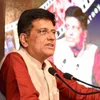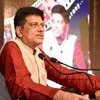Startups will never be harassed, says Commerce Minister Piyush Goyal
Commerce and Industry Minister Piyush Goyal says the government has come out with clarifications that startups will not be asked any questions if they are registered with and recognised by the Department for Promotion of Industry and Internal Trade.
Commerce and Industry Minister Piyush Goyal on Wednesday assured that startups would never be harassed and that the government was taking steps to promote them.
"I assure you that startups will never be harassed. They have to do the limited activity of registering themselves so that good law is not misused by a few people," he said at a function.
The minister said the government had come out with clarifications that startups would not be asked any questions if they were registered with and recognised by the Department for Promotion of Industry and Internal Trade (DPIIT).
"Few investments, which are genuine investments in startups, possibly got notice probably seeking some information. I think there is no harm in giving that information," Goyal said.

Piyush Goyal, Commerce and Industry Minister
According to him, there was no such thing called "angel tax". He said the issue of angel tax came up in the first place "because we have thousands and lakhs of shell companies which the Modi government de-recognised and on which we are taking action, where hawala operators used to create fake equity capital by issuing shares at a huge premium with no business activity at all and using that for money laundering".
Earlier, several startups made representations to the government about receiving notices from the Income Tax Department. They had claimed it was getting difficult for them to operate when the taxman was breathing down their neck.
The government launched the Startup India initiative on January 16, 2016, to build a strong ecosystem for nurturing innovation and entrepreneurship. It also provided them with certain tax benefits and other incentives. As many as 24,250 startups have been recognised by the department and are eligible for different tax incentives.
Protecting strategic and economic interests
Goyal also released the High Level Advisory Group (HLAG) report on promoting exports and investments at a function organised by industry body CII.
He assured that India would always protect its strategic and economic interests while engaging in multilateral talks. He urged people to talk, argue, and understand issues and not indulge in creating fear psychosis as the government would never sign on any trade agreement without consultations.
The HLAG report has suggested several steps to boost the country's goods and services exports. It has made specific recommendations for sectors such as pharma, electronics, and textiles.
For electronics, it has suggested shifting from a tariff-based policy to an incentive-based policy for manufacturing, incentives based on certain specified criteria such as technology, manufacturing capacity, and employment generation. Tax holiday for a considerable period, under Indian tax laws, to incentivise investment by domestic as well as foreign enterprises in high-end electronics has also been suggested.
Other recommendations include creation of a single ministry for the regulation of medical devices -- right from import and manufacture, up until pricing and sale of the products -- for easing the compliance burden on domestic and foreign manufacturers.
Besides, the report has called for creation of a pan-India Tourism Board, according infrastructure status to tourism, and amending tax rates.
It has also recommended issuance of 'Elephant Bonds' wherein people declaring undisclosed income would have to mandatorily invest specified amount in these securities.
"The government may introduce a one-time disclosure scheme for declaring undisclosed foreign income and assets and pay tax on such undisclosed income/asset at the rate of 15 percent. The scheme should also provide for locking 40 percent of the funds in Elephant Bonds...for a period of 20-30 years," the report said.
As per the report, the tariff regime needs to be simplified, rationalised, and made more predictable.
"Reduce the number of basic customs duty rates for industrial products. This should be done in a phased manner, mostly over five years. After the five-year transition period, tariff rates could be 0, 5, 10, 15, 20 or 30 percent," it added.
In certain very limited number of cases, particularly new technology products, basic customs duties may need to be increased to provide domestic industry with time to become competitive, the report said.
(Edited by Teja Lele Desai)









